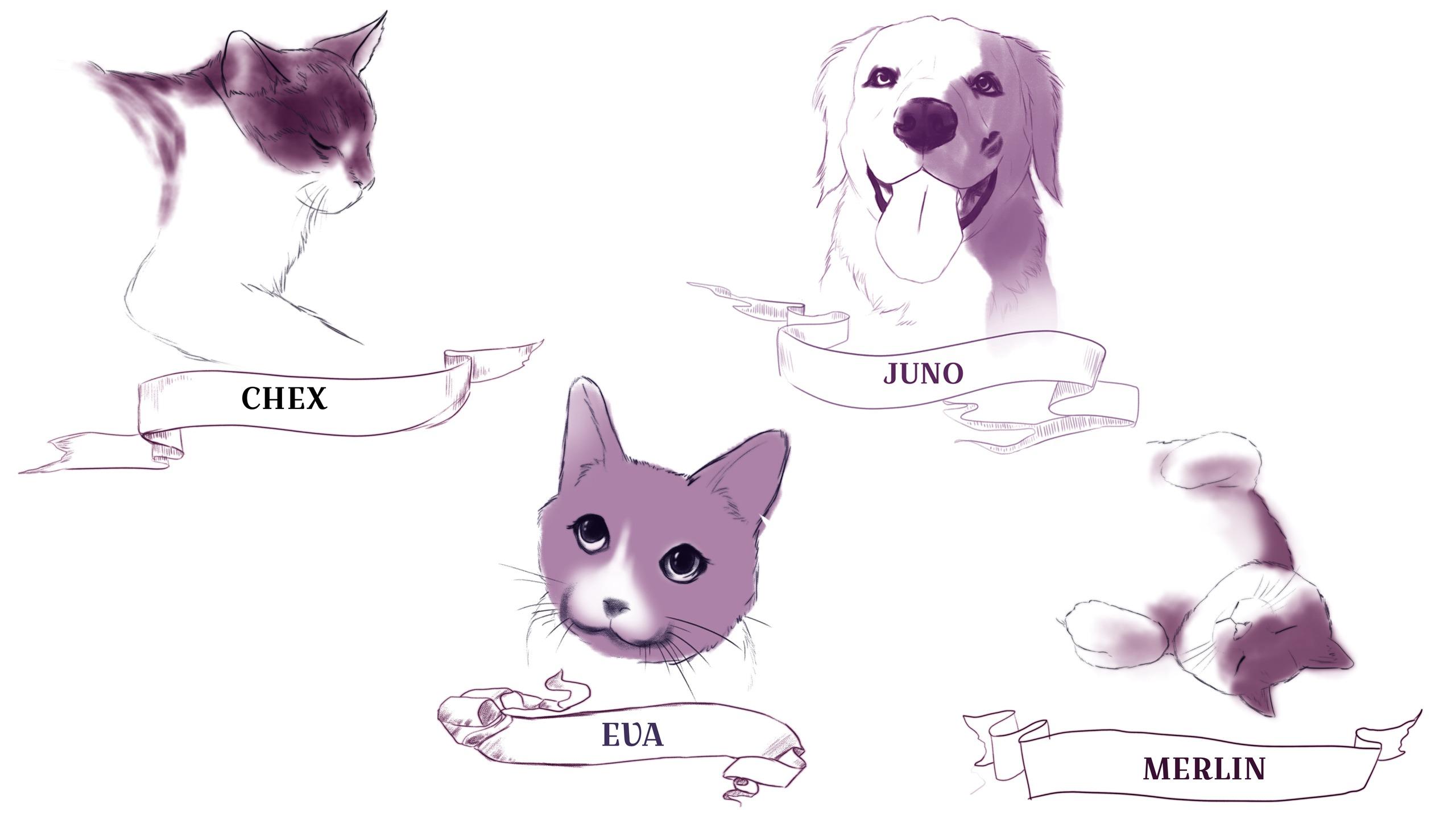Moving to the city is hard, but leaving your good boys is harder. Anastasia Andric writes about the Ryerson students who had to say goodbye to their best friends

On a regular day, El Patey pauses their schedule to give their 12-year-old tabby cat Merlin a few scratches. But a hot afternoon this past summer was different. Patey noticed Merlin lying in a patch of sunlight on the kitchen floor, looking peaceful as he sunbathed. Patey decided to lie down on the ground beside Merlin, giving him extra belly rubs and scratches.
Half an hour passed by, laying there on the floor, enjoying the small patch of sun that peeked through the window. “He got all of the belly rubs and scratches and sun he wanted,” Patey says. “He had me all to himself for ages and he was purring like a monster truck.”
Starting the next day, Patey would be away from their cat for the next two months—they were starting a new job as an assistant stage manager at a theatre in Stephenville, N.L.—a 12-hour bus ride away from their hometown of St. John’s. In addition, this September would mark their first year at Ryerson in the performance production program.
Saying goodbye to family and friends before moving away to an out-of-town university can be hard. People miss their parents and siblings, but being away from their pets is harder. For many, they are family members, the same as parents and siblings. The grief that comes with saying goodbye is just as real—even though oftentimes it isn’t taken as seriously.
According to a 2017 study by the Canadian Animal Health Institute, 41 per cent of Canadian households have at least one dog and about 37 per cent have at least one cat.
A 2005 study by Iowa State University shows more than 70 per cent of pet owners see their pets as children and 48 per cent report being emotionally dependent on their pet. The study also says that pets “may provide security and meet the emotional needs of many pet owners in ways that resemble children and parents.”
Having pets can also be good for one’s mental health. According to a study by Live Science, people benefit from having pets because “pets are good sources of social and emotional support for everyone.” The study said that pet owners tend to be just as close to their pets as they are to key people in their lives. With this in mind, it is no wonder why some Ryerson students find it difficult to cope with leaving their best buddies behind.
Because of Merlin’s old age, Patey cherishes the memory of that moment in the sun on the kitchen floor. “It was 10 out of 10, time well spent.”

A five-year-old chocolate Labrador just happens to be Jessie Fawcett’s rock. Her best friend Cooper is always there to console her in a time of crisis or when she’s feeling lonely. But September 2017 was Fawcett’s first year at Ryerson in the social work program—the beginning of a new life in Toronto away from her home in Mattawa, Ont. Despite all the exciting changes in her life, Fawcett found herself constantly thinking about Cooper. “I’m very attached,” Fawcett says. She longs for him any time she’s away.
According to a study by the National Centre for Health Research, people who have pets have “healthier hearts, stay home sick less often, make fewer visits to the doctor, get more exercise, and are less depressed.” Molly Metz, an associate professor of psychology at the University of Toronto, says that as social creatures, “we are sad when we are away from important others, and feel lonely when our needs for belongingness are not met. It makes perfect sense that being away from a pet evokes the same negative responses.” She adds that this feeling could be exacerbated during university, especially at the beginning when students are building new social networks and navigating new environments.
“We are sad when we are away from important others, and feel lonely when our needs for belongingness are not met.”
When the time came to start her move to Toronto, Fawcett couldn’t stop crying over leaving Cooper. “I bawled my eyes out.” Fawcett couldn’t help but feel guilty for being far away from him. And it didn’t help that her new life in the city was proving to be horrible.
Fawcett constantly found herself thinking of Cooper. She’d had him since he was a puppy, born from a litter birthed by the dog she owned before, Xena. White-pawed and green-eyed, Cooper is often asocial and barks at people out of a need to protect Fawcett. Fawcett thought she’d be okay living on her own, but after only a few days, the homesickness hit as she was consumed by worry and anxiety. She kept thinking about her family and friends that she left behind. “I was worried I would fail this step of my life.”
The only way Fawcett made it through those first few months was by having her dad send her pictures of Cooper on a daily basis.
Fawcett isn’t alone in this. According to Heather White, community outreach and education manager at the Oakville and Milton Humane Society, separation anxiety in pet owners is not uncommon. White says that it’s normal for pet owners to feel guilty when they’re away from their pet. She said that in some cases, when people are separated from their pals, they can experience shame for not being able to take care of them, have panic attacks or have difficulty sleeping.
But the pet owners aren’t the only ones experiencing this—pets can often feel anxious when separated from their owners too, White says. Dogs often have physical reactions, some of the most common include being fearful, aggressive, panting, hiding, pacing, shaking, attempting to escape and some might look for their owner when they are taken outside, or pull towards cars in the parking lot to check for their owner.
By the time Easter weekend rolled around, Fawcett finished her first semester at Ryerson and was halfway through her second. She was wrapped up in schoolwork, projects and studying for exams. Seeing Cooper during a break home was exactly what she needed.
It was a cool spring day when Fawcett arrived back in Mattawa. The moment she walked through the door of her house was a moment that she will never forget. She walked in and Cooper immediately began wagging his tail and ran straight into her arms. Fawcett dropped to the floor and hugged Cooper tightly with a smile stretched across her face. Warm tears pooled in her eyes.

Merlin is not Patey’s only cat. Patey was in a lecture when they received a call from their mom. She said she took seven-year-old Chex to the vet for the last time. Chex had been suffering from stomach cancer for a while. They didn’t think the call would come so soon.
Sadness and guilt struck in Patey. While Chex was suffering from cancer, Patey was 3,000 kilometres away, and now they knew they’d never see Chex again.
White says people’s reactions to the death of a pet can often be devastating. “The loss of a pet for some people is no different than losing a close family member or dear friend.” It can sometimes be more difficult for those who are away from their family, like Patey was, as they can’t grieve with family members going through the same loss. In these cases, White suggests bereavement groups for those who are experiencing the loss of a pet and who wish to spend time with “like-minded people and feel comfortable sharing their feelings.”
After a few weeks, Patey’s family got a new playmate—a small tuxedo cat named Eva. Patey was happy to have a new family member when they visited home. In an effort to keep Chex’s memory alive, his veterinarian made plaster casts of the cat’s pawprints. Patey took the plaster casts, printed a few of Chex’s photos and put them all in a shadow box. They gave it to their family that year for Christmas.

On a fall day in 2015, Janhvi Johri was prepping for her move from Oakville to downtown Toronto. The then-first-year business management student was in her bedroom packing her bags when she noticed six-year-old golden retriever Juno staring at her with a pouting face. Juno’s dark brown eyes avoided Johri’s glance as she tried to call her over to pet her. Normally when Juno hears her name, she rushes over with her long pink tongue falling out of the side of her mouth, tail wagging. But Johri could tell that Juno knew she was leaving.
Juno is familiar with what suitcases mean because of how often Johri’s dad travels for work, so she knew that her owner must be leaving now, too.
“I wish I could communicate to her that I would be back again soon,” Johri says.
Johri thought about the fact that she would easily be able to call and video chat her family and friends but it wouldn’t be the same with Juno.
Metz points this out as well: “At least with human friends, we can stay in touch via texting or video-chatting, thus increasing ‘psychological proximity,’ if not physical proximity. But because it can’t be that way with pets, “we can’t feel the warmth and connection we are looking for, and also feel guilty that they might not understand where we have gone.”
“I wish I could communicate to her that I would be back again soon.”
With a busy school schedule ahead, Johri knew she wouldn’t be able to visit home more than once a month. As she was petting Juno, she started to also think about how different things would be once she graduates and finds a full-time job. “I feel very anxious when thinking about starting a new job because I will visit her even less.”
While it can be difficult for people to leave their pet behind, White says there are ways to be with your pet even when you’re in another city. “If people are worried about leaving their pets because they are overly attached, one method of staying connected is adding a camera with an app that connects to your phone so you can check on them,” she says. White says that certain apps allow pet-owners to see what their pet is doing when they’re alone and even interact with them and offer treats.
Johri is now in her fourth year at Ryerson and still shares a special relationship with Juno. She is very attached and loves her golden retriever with all her heart. “I feel so happy when I’m back in my hometown with her. When I come home, she is so excited to see me.” She makes sure to spend a lot of time with Juno when she’s at home, but always dreads the moment when she must leave again.
Dr. Marty Becker told VetStreet, a website for pet health and care resources, that there are numerous ways to cope with separation anxiety when leaving your pets. Becker says to leave prepared—making sure that your pet is in good hands and to communicate while away to hear how they are doing. Dr. Becker also recommends to take photos of your pet with you—that way you can see their faces when you’re away.
As Johri was leaving with her luggage in hand, she looked back and saw Juno laying flat on her stomach in the living room, with her head rested between her paws.

Merlin has a way of punishing Patey when they’ve been gone for too long. He has a 12-hour cold-shoulder period. “It’s not like a dog who’s all over you when you step in the door,” Patey says. He lets Patey hug him, but he refuses to let them be too cuddly. It takes him a couple days to forgive Patey for leaving.
But after that short period, Merlin goes back to being a friendly cat. He “turns into a big sook,” and is insistent on close contact for a few consecutive hours.
“He likes to be the little spoon.”










Leave a Reply